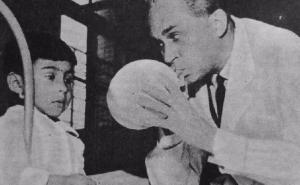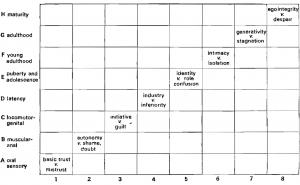, (1897-1978)
source:International Dictionary of Psychoanalysis
Edith Jacobson, psychoanalyst and physician, was born September 10, 1897 in
Haynau, Germany and died December 8, 1978 in Rochester, New York.
Edith Jacobson's father was a physician and her mother was a talented musician.
She attended medical school at Jena, Heidelberg, and Munich, and received her
medical degree from Munich in 1922. From 1922 to 1925 she was a pediatric intern
at the University Hospital in Heidelberg.
Jacobson traced her interest in psychoanalysis to the period of her pediatrics
internship, during which she observed instances of childhood sexuality (Milrod,
1971). In 1925 she began training at the Berlin Psychoanalytic Institute, where
her analyst was Otto Fenichel. During these years she also participated in "Das
Kinder Seminar," which was formed by candidates at the Berlin Institute and led
by Fenichel (the name is an ironic reference to the junior status of its
organizers, not to its substantive focus).
In 1934 she was named a training analyst at the Berlin Institute. During the
1930s she was imprisoned by the Nazis because she refused to divulge information
about a patient (Kronold, Edward, 1979). During her imprisonment she became
seriously ill with Graves disease and diabetes. While hospitalized in Leipzig
she was able to escape from Germany with the help of her close friend Annie
Reich, and Reich's second husband. In 1941 she emigrated to the United States of
America where, as a member of the New York Psychoanalytic Society and Institute,
she was a distinguished training analyst and teacher.
The investigation of ego and superego functioning, the processes of
identification underlying their development, and their role in depression were
central to Jacobson's theoretical and clinical work. In her writings she sought
to construct an overarching developmental perspective which would do justice to
both drives and to real objects and their representations in building up of the
ego and superego. Jacobson and Heinz Hartmann introduced the concept of
self-representation into psychoanalytic theory, and she was particularly
interested in the fate of self-representations in depressive and psychotic
illness. Her collected papers, Depression: Comparative Studies of Normal,
Neurotic, and Psychotic Conditions (1971), permit the reader to follow the
development of her thinking over the years. The Self and the Object World (1964)
is Jacobson's main theoretical text. She observes that in psychotic and
borderline patients processes of regression lead to severe deterioration of
object relations, ego functions, and superego structure and function. This is
accompanied by dissolution of the essential identifications on which the
experience of identity is founded.
Jacobson's work is "the first attempt to trace, within a strictly psychoanalytic
framework, the development of the self . . . and its mental representations"
(Tuttman, 1981). She is the first theorist to attempt to integrate drive theory
with structural and object relations theory in a comprehensive, developmental
synthesis, and her influence on subsequent work in this area has been profound.
NELLIE L. THOMPSON
See also: Ego boundaries; Identity; New York Psychoanalytic Institute; Object
relations theory; Primary identification; Self; Self-representation.
Bibliography
Jacobson, Edith. (1964). The self and the object world. New York: International
Universities Press.
——. (1971). Depression: Comparative studies of normal, neurotic and psychotic
conditions. New York: International Universities Press.
Kronold, Edward. (1979). Edith Jacobson, 1897-1978. Psychoanalytic Quarterly,49,
505-507.
Milrod, David. (1971). Oral history interview with Edith Jacobson. New York :
A.A. Brill Library, New York Psychoanalytic Institute
Tuttman, Saul. (1981). The significance of Edith Jacobson's The Self and the
Object World in contemporary object relations theory. In C. Kaye M. Zimmerman,
S. Tuttman (Eds.): Object and self: A developmental approach, essays in honor of
Edith Jacobson (p. 81-102). New York : International Universities Press.
Jacobson, Edith (1897-1978)
26
www.nmgpsy.com内蒙古心理网
标签: Jacobson,Edith 心理咨询,心理



